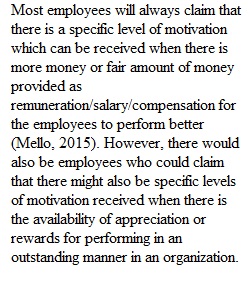


Q Working individually, you must complete the "Critical Thinking" questions at the end of Chapter 11. These assignments are designed to incorporate the three unifying concepts of this course. These are 1) a "Human Capital" point of views. vs. a traditional Personnel Management point of view; 2) decision making that is driven by Metrics and Analytics vs. emotional appeals; and 3) PARTNERSHIPS between Line Leaders and HR Specialists vs. separate disjointed functional responsibilities held by each. This paper must be a minimum of 4.5 pages and comprehensively incorporate ALL of the questions in the assignment, as well as the associated readings included. Normal font size and line spacing are expected. Title page and Reference page are required, but not part of the page length requirement. Be sure to include the questions in your response as headings. Remember to submit your assignment for grading when finished. Week Six: Chapter Eleven "Critical Thinking" 1. Does money motivate employees? Why or why not? 2. Why should compensation systems be equitable? How can an organization design an equitable compensation system? 3. Compare and contrast the four job evaluation methods. Give an example of an organization in which each of the four methods might provide an optimal strategic fit. 4. Discuss the pros and cons of employee pay being fixed versus variable and dependent on performance. How might such decisions impact recruiting, motivation, and retention? 5. Analyze your current job responsibilities. Determine whether the method by which you are compensated is appropriate. 6. Is performance-based pay effective? Why or why not? How can performance-based pay systems be better designed to ensure optimal results? Reading 11.1 7. What are the advantages and disadvantages of organizational policies that mandate pay secrecy? Consider this question from the perspective of managers, employees, and owners. Is pay secrecy a good practice? Reading 11.2 8. What obstacles exist to developing pay-for-performance plans in the public sector? How can these obstacles best be overcome? Do public sector pay-for-performance plans differ from those found in the private sector? PreviousNext
View Related Questions